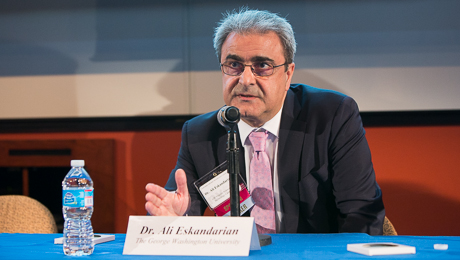GW is making a strategic investment in the growing field of big data and analytics. Recently, Ali Eskandarian, dean of GW’s Virginia Science & Technology Campus (VSTC), assumed a leadership role as co-chair of the Northern Virginia Technology Council’s (NVTC) new Big Data & Analytics Committee. The Committee builds on GW’s partnership with NVTC and Attain LLC to sponsor a research report conducted by Chmura Economics & Analytics and released in May at a jointly organized big data symposium hosted at VSTC.
The new Committee, co-chaired by Eskandarian and Greg Baroni from Attain LLC, will explore educational, networking and public-private partnership opportunities in this area. Ultimately, the Committee’s goal is to stimulate economic growth by promoting the Commonwealth and the region as a national and global center for big data and analytics talent and resources.
"It is a privilege to serve as the co-chair of this committee. GW is making significant investments in various aspects of big data including ongoing enhancements of high-performance computing capabilities at our Virginia Science and Technology Campus and establishment of new research institutes. We look forward to working with our academic, corporate, and public sector partners to stimulate economic growth and promote the region as a hub for big data,” said Eskandarian.
GW’s interest and investment in big data is driven by the growing need to support faculty research. The Campus already is involved in many aspects of big data and analytics and plans to increase activity. Noteworthy current projects include:
Computational Biology Institute:
The Computational Biology Institute, led by Prof. Keith Crandall, combines computer science and biology by using mathematical models and computer simulations to better understand how complex biological systems operate and evolve. This emerging field draws on the expertise of engineers, mathematicians, computer scientists, statisticians, biologists and clinicians to develop and implement computational tools that help researchers synthesize, interpret and manage an ever-growing volume of biological information.
Colonial One—VSTC’s Supercomputing Cluster:
GW launched Colonial One last year, a new supercomputing cluster at VSTC. The cluster was designed as a shared computer and storage resource to support a wide array of researchers with many technical and computational needs that require cutting-edge computing and network capacity and engineering services.
High-Performance Research and Education Infrastructure:
The Capital Area Advanced Research and Education Network (CAAREN) operates a high-performance research and education IT infrastructure connected to Internet2's 100-gigabit per second fiber optic network. CAAREN provides high-speed global networking to schools and community institutions in Washington, DC, Northern Virginia and Maryland.
High Performance Computing Laboratory:
VSTC hosts a distinguished High-Performance Computing Lab (HPCL), led by Prof. Tarek El-Ghazawi. The HPCL focuses its research on parallel and distributed computing with emphasis on high-speed computing. The lab operates through CHREC (the Center for High-Performance Reconfigurable Computing), with joint funding from NSF, industry and government; and IMPACT (Institute for Massively Parallel Applications and Computing Technologies), a university-wide chartered institute.
GW plans to increase our involvement with big data through corporate engagement and specialized research and academic programs. The Northern Virginia region holds great potential for being a hub for big data and GW intends to be one of the leaders.


